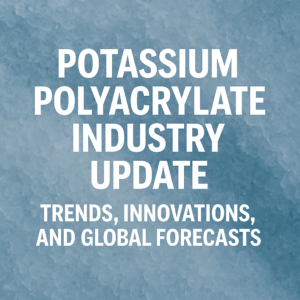The potassium polyacrylate (PPAK) market is witnessing rapid growth, driven by increased demand in hygiene, agriculture, and industrial applications. Here is a comprehensive look at the latest developments shaping the PPAK industry in 2024 and beyond.

1. Market Growth and Forecast
According to recent global market analyses, the potassium acrylate market is valued at approximately USD $86.1 billion in 2023 and is projected to grow to $90.96 billion in 2024. By 2032, it is expected to reach nearly $140.9 billion, registering a CAGR of 5.6%.
This aligns with the broader super-absorbent polymers (SAP) sector, of which PPAK is a major component. SAPs are anticipated to grow from $91.2 billion in 2024 to over $209 billion by 2037, expanding at a CAGR of around 6.6%.
2. Key Application Areas
- Hygiene Products: The majority of demand comes from diapers, sanitary napkins, and incontinence products.
- Agriculture: PPAK is extensively used as a soil conditioner to improve water retention, especially in drought-prone regions.
- Industry: It is applied in wastewater treatment, oil drilling, and industrial coatings and adhesives.
3. Sustainability and Innovation
- Eco-friendly Formulations: Companies like gelsap are introducing biodegradable SAPs such as BIOGEL with 10–30% bio-based content.
- Advanced R&D: Significant research is underway to enhance absorption capacity, biodegradability, and cost-effectiveness.
4. Strategic Investments
- Manufacturing Scale-ups: Firms such as BASF and LG Chem are expanding bio-based SAP facilities in Europe and Asia.
- CDMO Growth: Organizations like Biosynth Carbosynth and BOC Sciences are strengthening their custom chemical manufacturing services to meet demand.
5. Regional Highlights
- Asia-Pacific is leading market growth due to population expansion, urbanization, and agricultural needs.
- North America and Europe continue to prioritize hygiene and eco-friendly agricultural solutions.
Summary Table
| Stakeholder | Opportunities & Takeaways |
|---|---|
| Manufacturers | Invest in bio-based and sustainable production technologies |
| Agribusiness | Leverage soil conditioners for improved yields and water savings |
| Regulators | Consider updates to eco-certification standards |
| Investors | Monitor biotech and polymer firms focusing on green SAPs |
Final Thoughts
Potassium polyacrylate is increasingly vital to a range of global industries. With sustainability taking center stage and demand consistently growing, the PPAK market is poised for significant innovation and expansion in the coming decade.
Stay tuned for more insights and deep dives into the world of smart polymers and specialty chemicals.

